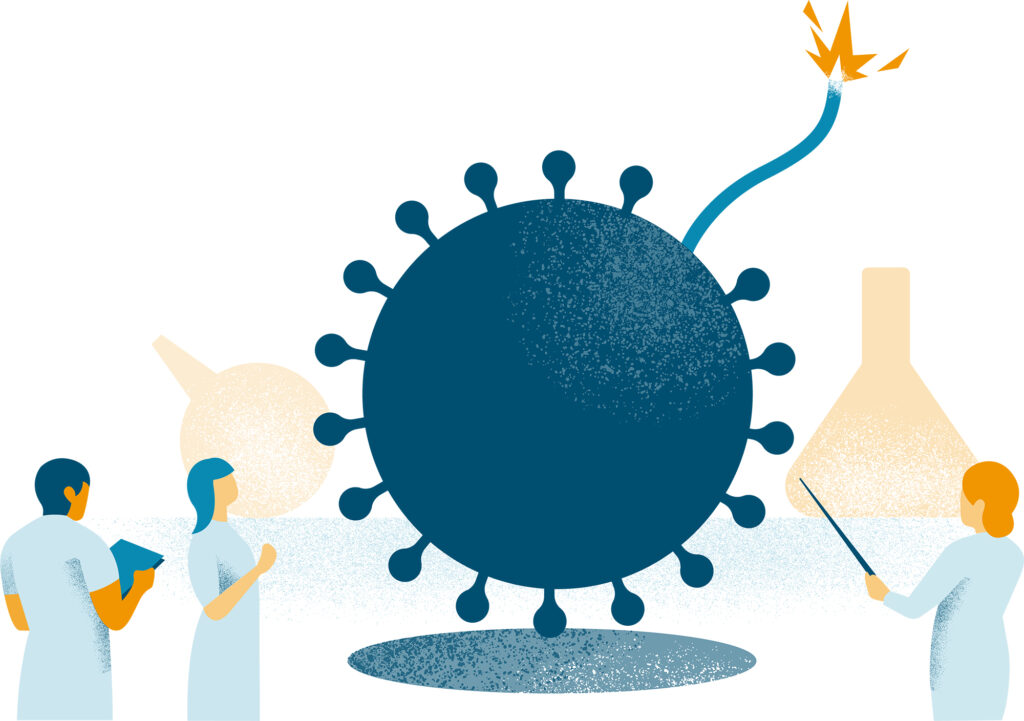
Gain-of-function experiments on pathogens – a dilemma that can hardly be solved?
Paradigmatic for the ambivalence of science are so-called gain-of-function experiments on pathogens, through which the pathogens acquire new or previously undescribed properties in the laboratory. This is especially true if the pathogens are made more transmissible during the experiments in the laboratory or if they can cause a more severe disease in humans or animals due to new properties. Through these experiments, it is hoped to achieve a better understanding of the mechanisms of infection and transmission and to be better prepared for the regular outbreaks of naturally occurring pathogens (so-called emerging infections).
Work on highly pathogenic H5N1 influenza viruses
In 2011, two research groups in the Netherlands and Japan/USA identified five genetic alterations necessary for avian highly pathogenic H5N1 influenza viruses (so-called avian influenza viruses) to become airborne transmissible between mammals. The research projects caused great concern worldwide about the usefulness and risks of such work, as there were fears that the viruses produced could be unintentionally released into the environment through negligent actions. Further, there was concern that the new knowledge about the pathogens could be misused for the targeted generation of biological weapons. The research groups defended the importance of their work by saying that the results could be used to accurately predict how these viruses could gradually evolve into a threat to humans through changes that occur spontaneously. With this knowledge, it would be much easier to classify the pandemic potential of new virus variants that regularly occur in nature and to take targeted protective measures, e.g. to break chains of infection at an early stage or to develop targeted vaccines.
Being prepared for pandemics
The first described cases of Covid-19 disease in Wuhan, China, where gain-of-function experiments were also performed on certain corona virus isolates in a high-security laboratory, and the as-yet-unresolved origin of the SARS-CoV-2 pandemic have reignited public debates about this research. Stricter testing procedures have since been debated in the U.S., which many researchers in the field view as a disproportionate and impractical bureaucratization of pathogen research. However, the pandemic coronavirus, which has spread rapidly since 2019, and the rapid vaccine development against SARS-CoV-2 also highlighted the importance of early research on highly pathogenic agents in order to draw on existing knowledge in such acute situations. The pandemic also underscored how essential it is to have freedom of research and an international exchange of research results that is as barrier-free as possible.
Legal framework and self-governance of the sciences in Germany
The potential risks of research on pathogens are taken into account by numerous regulations in Germany, the aim of which is to ensure biological safety (biosafety). These include, in particular, the Biological Substances Ordinance, the Genetic Engineering Act and the Infection Protection Act. There are also a number of regulations relating to the problem of the possible misuse of biological knowledge, which is referred to as biosecurity. These include the regular criminal law, the United Nations Biological Weapons Convention and the regulations of the Federal Office of Economics and Export Control, which are intended to prevent the development, spread and use of biological weapons. In addition to the precautionary measures taken by the security authorities, such as the Federal Office of Civil Protection and Disaster Assistance, and the work of the law enforcement agencies, prevention by the self-governance of the sciences is of particular importance. In 2008, the German Research Foundation (DFG) published a code of conduct for dealing with highly pathogenic microorganisms and toxins and updated it in 2013. Furthermore, the “Recommendations for Handling Security-Relevant Research” by the DFG and Leopoldina, which apply to all disciplines, and the “Commissions for Ethics in Security-Relevant Research” (KEFs, German acronym), which have been established throughout Germany, are intended to help raise awareness of potential risks among researchers. By offering advice, the KEFs help to minimize risks, for example through regular, structured weighing of risks and benefits, or when alternative, possibly less risky research strategies are to be explored.

